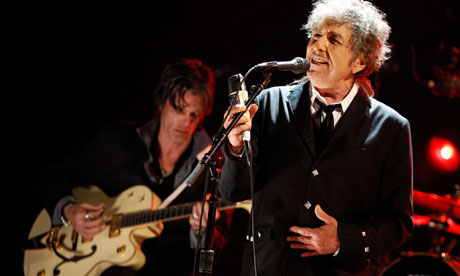
Bob Dylan's new album arrives and – as has become traditional – you can hardly hear the old boy for the clank of five-star reviews hitting the table. Connoisseurs of the latterday Dylan review will be pleased to learn that 2012 brings a fine vintage, with many old friends present and correct. There's been a strong showing from the How Did He Do That? faction, marvelling at the superhuman leaps of imaginative daring that have led Dylan not only to mention Leonardo DiCaprio in a song about the Titanic, but also to use the line "I read the news today, oh boy" in a song about John Lennon's murder.
One of their number has claimed Tempest to be among Dylan's "weirdest albums ever", a pretty bold claim given that it follows Christmas in the Heart, which came with a free set of Christmas cards and featured Dylan rasping his way through Here Comes Santa Claus. It seems a bolder claim still when you actually listen to Tempest. The music is the same stew of beautifully played blues, rockabilly, folk and country as every Dylan album for the last 12 years: styles you might call pre-rock or, perhaps more pertinently, pre-him. Bob Dylan, it seems, is determined to see out his days playing pop music from the era before Bob Dylan changed pop music for good, as if he'd rather forget that he ever did so. The weirdest thing about Tempest might be its cover, which looks unaccountably like a perfume ad in a Sunday supplement.
Hot on their heels come the Hilarious Lyrics massive, rock criticism's answer to those people who claim to spend every morning in hysterics at the latest installment of Doonesbury. They keep telling you how incredibly funny Dylan lyrics that aren't remotely funny are. This time around, they've been killing themselves at the side-splitting one-liner: "I'm not dead yet, my bell still rings".
On one hand, this stuff is baffling. You look at the guy approvingly comparing Tempest's 14-minute, 45-verse title track to 1965's Desolation Row and think: what are you talking about? Doesn't it diminish one of Dylan's masterpieces – a song that drags the listener through a phantasmagoria of imagery so vivid you barely notice its length – to compare it with this, which offers flashes of brilliance and occasional great lines, but ultimately goes on a bit? On the other, perhaps the response tells you something about Dylan's career, full of riddles and contradictions, the artist never exactly reticent in letting people know they'd called it wrong. As said career reaches its home straight, nobody wants to be clueless old Mr Jones, of Ballad of a Thin Man fame: better to insist you know what's happening here even when not much actually is.
The problem is that a decade of blanket praise writes white and might discourage people from bothering with Tempest, which would be a pity. It has failings, not least Roll On John, a tribute to the slain Beatle that certainly makes you miss him: were he around to hear it, you suspect his face would be quite a picture. Given that Dylan's now had 32 years to ruminate on his friend's life and death, you might hope he'd come up with something a little more incisive than "come together right now over me … Lord, you know how hard it can be", which, frankly, is like something Noel Gallagher would write.
But equally, there are incredible moments. No one has ever articulated furious contempt more vividly than Dylan at his peak, an emotion that's been noticeably lacking from his recent albums. But now someone or something has clearly riled him. Perhaps it's the bankers: it certainly sounds like them getting it in the neck on the viscerally thrilling Early Roman Kings.
Whatever the cause, his mood often sounds murderous. The first intimation of terrible violence arrives one minute in: a little incongruously, during the perky Western swing of Duquesne Whistle. Narrow Way welds a bracing Chicago blues riff to a series of withering put-downs: "Your father left, your mother too/ Even death has washed his hands of you." Anger always suited Dylan's voice: he spent most of the 60s and 70s sounding like he was sneering even when he wasn't. It still suits him. On Pay in Blood, fury and his ruined larynx combine to remarkable effect. The opening line comes out as a terrifying, incomprehensible growl that sounds like one of those death-metal vocalists in full flight. There's something potent about hearing a singer-songwriter famed for his articulacy rendered incoherent with rage. "Another politician pumping out the piss," he sings later, the microphone audibly struggling to cope with the ferocity of his delivery. "You bastard, I'm supposed to respect you? I'll give you justice."
To praise Tempest you don't need to suggest, as the august rock critic on the BBC's Newsnight Review did, that it is "up there with Blonde on Blonde and Blood on the Tracks", which would make it one of the important albums ever made. Anyone who hears that and raises their expectations accordingly may be disappointed. That wouldn't be the right response to Tempest at all.

